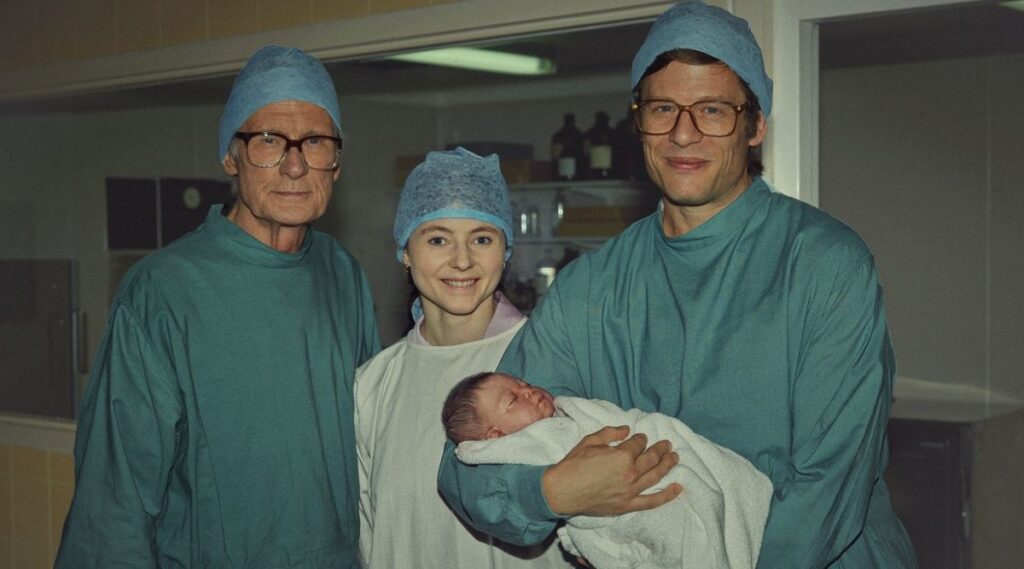Joy (2024) — The Birth of IVF is the timely, heroic story of the team that invented the process of in vitro fertilization that has allowed millions of children to be born since its inception, whose parents otherwise could not bear children. Directed by Ben Taylor and written by Jack Thorne, the movie follows Jean Purdy (Thomasin McKenzie), Bob Edwards (James Norton), and Patrick Steptoe (Bill Nighy), the team of doctors and scientists who invented IVF, as they struggle over a decade to perform this miracle.
On the one hand, Jean is definitively Joy (2024)’s main character. On the other hand, the movie opens with a really awkward voiceover in which Dr. Edwards implores some unknown entity at some unknown time to make sure Jean’s name is included on a plaque commemorating their collective accomplishment. This opening sets the tone for the rest of the movie. No matter how much Joy (2024) tries to center Jean Purdy as the tale’s heart and hero, it can never escape the vortex of Edwards’ perspective.
It doesn’t ruin the movie by any means, but it does weaken it. One of the first things you will learn about Jean Purdy if you Google her is that she was the first person to observe the divided cells that would eventually become the first person born through IVF, Louise Joy Brown. In Joy (2024), it seems as though Edwards first made this observation, and virtually no glory is given to the moment. Repeatedly, plotlines about Purdy are curtailed by Edward’s whims or feelings.
Joy (2024) is too focused on Ewards for a movie that’s meant to be about Purdy.

But when you put the most boring character in the movie aside, Joy (2024) still has plenty to give. McKenzie puts a lot of heart into her character, as do Nighy as Dr. Steptoe and Tanya Moodie as Matron Muriel. The movie would probably be a bore without them. It’s very procedural—even the moments with the most emotion feel paint-by-numbers. But because these three give a lot of heart, they can work around Norton’s intentionally stiff character.
For lovers of tech talk and the triumph of the human will, Joy (2024) is full of it. The science feels nitty gritty in a fun way, even if it means the movie is following a scientific method at times. But because it’s keenly aware of the prescribed nature of experimentation, Joy (2024) is wise enough to use science talk as a tool instead of it becoming a disadvantage. It’s hard not to be moved by lines about the one successful experiment in a million or a stodgy man of science guarding his heart so it doesn’t break, too.
However, because Joy (2024) was principally created by people with more of Edwards’ perspective than Purdy’s, most scenes involving the “Ovum Club” fail to reach their potential. These women volunteered to be part of the IVF trial over many years despite enormous personal risks. Purdy endures some of the backlash from the conservative social order, but Edwards really takes the brunt of it. The Ovum Club is, fortunately, shielded from the public throughout the movie, and Jean spends time trying to get to know them and humanize their circumstance for herself and the audience.
Women are rarely, if ever, whole characters in Joy (2024).

Despite this, these scenes sometimes fall short when all the characters do is talk about their circumstances. There’s a fairly impactful moment in the movie where Edwards tries to prove he does care about the women in his trial by naming them all and explaining that he prefers to see them as test subjects simply so he doesn’t get too attached when their tests inevitably fail again and again.
It’s poignant but also perfectly encapsulates how the movie treats the women, too. They’re rarely, if ever, whole characters. They don’t experience things for themselves as they’re kept at the same distance Edwards treats them with. It’s not to say that they don’t feel like real people or that they don’t provide emotional resonance; the limited perspective keeps Joy (2024) from reaching greater heights.
While its perspective is limited and its plot is procedural, the filmmakers’ reverence for the people who made IVF possible is evident. Through McKenzie and Nighy, enough heart shines through to make Joy (2024) a successful movie, even if it leaves a little to be desired.
Joy (2024) is streaming now on Netflix.
Joy (2024) — The Birth of IVF
-
Rating - 6.5/106.5/10
TL;DR
While its perspective is limited and its plot is procedural, the filmmakers’ reverence for the people who made IVF possible is evident. Through McKenzie and Nighy, enough heart shines through to make Joy (2024) a successful movie, even if it leaves a little to be desired.







